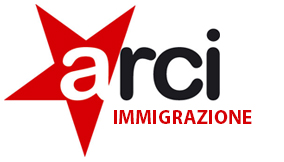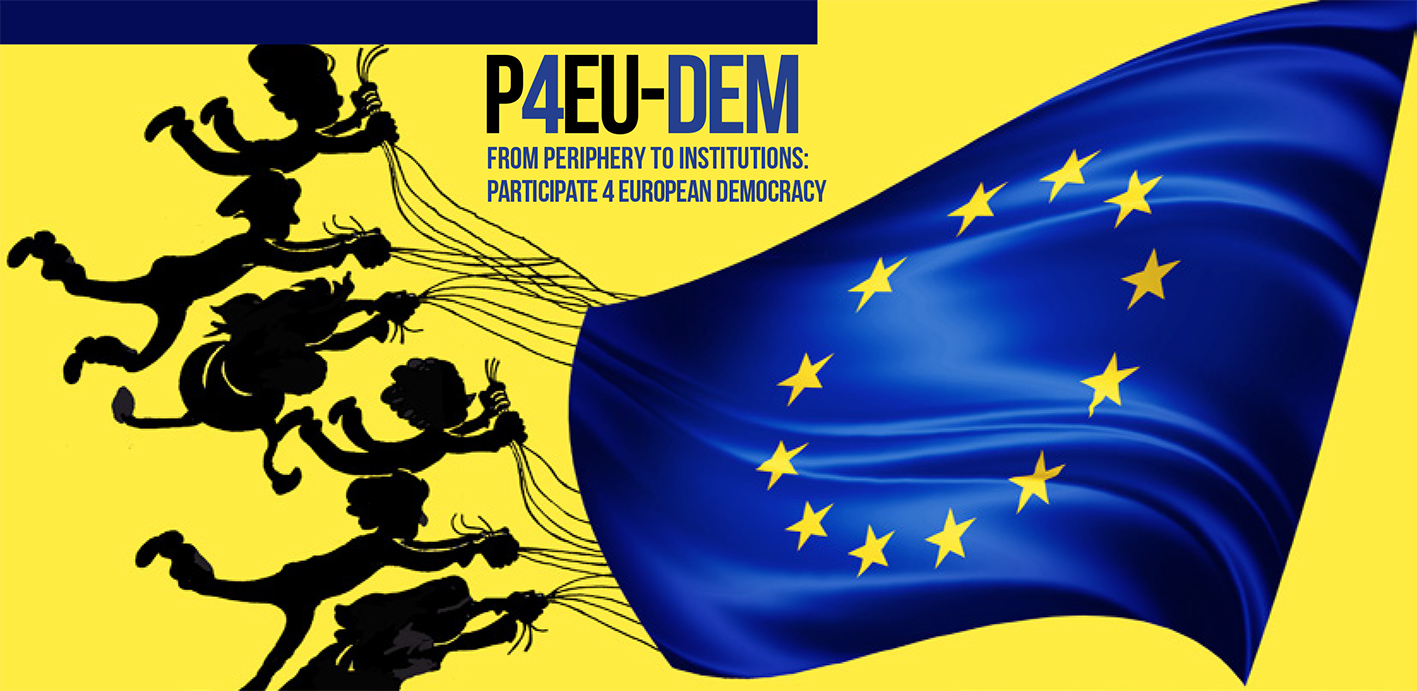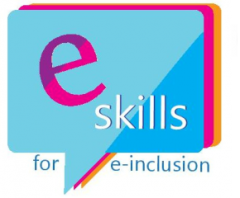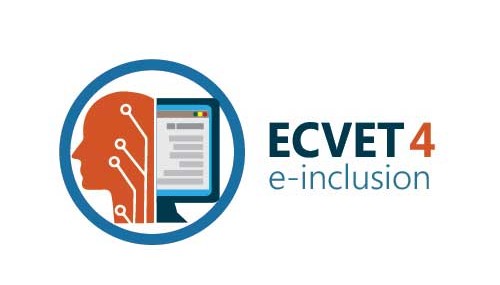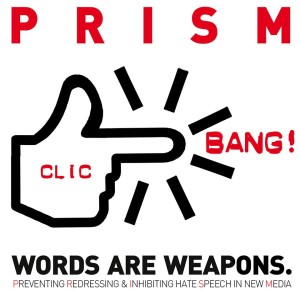From periphery to institutions: participate 4 EU democracy
Il progetto From periphery to institutions: participate 4 EU democracy, sostenuto dall’Unione Europea attraverso il programma Europe for Citizens, si è proposto di offrire ai cittadini di cinque paesi – Italia, Spagna, Francia, Romania e Danimarca – occasione di diretta partecipazione nel dibattito delle istituzioni europee, e di attirare l’attenzione dei rappresentanti istituzionali europei sui dubbi e le preoccupazioni specifiche dei cittadini delle «periferie d’Europa» su questi temi.
Nell’ambito del progetto From periphery to institutions: participate 4 EU democracy sono stati organizzati sette eventi nazionali e due eventi internazionali dall’Associazione Arci, promotrice del progetto, e dai partner Ligue de l’Enseignement (FR), Fundacion Cives e Andalucia Acoge (ES), New Europe (DK), Associatia Pro Democratia (RO).
The project « From periphery to institutions: participate 4 EU democracy » was funded with the support of the European Union under the Programme "Europe for Citizens"
Nine events have been carried out within this project:
Event 1 – International meeting: "Migration at the core of the European and Mediterranean crisis", within the Sabir Festival
Participation: The event involved approximately 400 citizens, representatives of associations and networks, social activists, members of the European and Nationals Parliaments, Pozzallo inhabitants, journalists including participants from 25 countries (Spain, Mali, Greece, France, Great Britain, Bulgaria, Estonia, Turkey, Romania, Lebanon, Libya, Croatia, Serbia, Morocco, Tunisia, Egypt, Austria, Germany, Hungary, Belgium, Denmark, Czech Republic, Kurdistan, Syria, Finland). International CSOs and networks represented were more than 50.
Location / Dates: The event took place in Pozzallo, Sicily (Italy), from 12/05/2016 to 15/05/2016.
Short description: The aim of the event was to discuss on some priorities of the European agenda, in order to improve coordination and common action on topics such as new European Union migration politics and policies. Citizens have had the chance to approach and discuss these items with NGOs working in this field, as example of active participation into the European debate. One of the main important event was a meeting with 300 students of Pozzallo that attended the Forum and had the chance to discuss on Europe and their perception of being the front door of migration arrivals with the President of Italian Parliament.
Event 2 – Debate: ‘EU for Refugees’
Participation: The event involved 82 citizens.
Location / Dates: The event took place in Copenhagen, Denmark, on 24/11/2015.
Short description: The aim of the event was to address three different topics related to the refugee situation in Europe: Moral, Law and Policies. The result of the conference was the participant from each group had made an appeal to our politicians, on recommendations to be made for the current situation. The picture shows the handover to the Danish Prime Minister Lars Løkke Rasmussen. The appeal overall conclusion had a clear signal of promoting a more nuanced debate about refugees in Denmark and in Europe, and present long-term solutions on the refugee situation, were the member states need to find common solution in close cooperation
Event 3 – Debate: ‘Can we see ourselves in the eyes in 20 years’
Participation: The event involved 90 citizens.
Location / Dates: The event took place in Copenhagen, Denmark, on 19/04/2016.
Short description: The aim of the event was to debate the issues, if we can look ourselves into the eyes in 20 years, in regard how the refugee situation have been addressed by senior officials and politicians. This discussions conclusions was a concerned about the current situation in Europe and underlined that the increase nationalism in the different European Countries can have an effect on the European project
Event 4 – Debate: ‘The War in Syria, Refugees in Europe’
Participation: The event involved 53 citizens.
Location / Dates: The event took place in Copenhagen, Denmark, on 28/04/2016.
Short description: The aim of the event was to discuss the war in Syria and refugees in Europe. It was a broader discussion about the entire situation. There were prominent presentations about the current situation and also about what we should do on a political level, as different representatives from the political parties were invited for a concrete diskussion about the situation as a whole.
Event 5 – Seminar: ¨What role does the welfare state play in the inclusion of immigrants?”
Participation: The event involved 58 citizens, including interest groups, NGO´s, local politicians, migrants associations, and citizens from different locations of Spain.
Location / Dates: The event took place in Madrid, Spain on 29/01/2016.
Short description: The aim of the event was to explore what role does the welfare state play in the inclusion of immigrants, in order to share, compare and build a European view of the subject based on citizens participation.
Event 6 – Spaces for discussion and citizen participation in Algeciras, Melilla and Ceuta (Spain)
Participation: The event involved 59 citizens, including participants form Melilla, Ceuta and Algeciras (Spain) mostly belonging to social organizations, but a large group belonged to political groups, trade unions, public administrations, universities, and a minor group was persons who attended individually.
Location / Dates: The event consisted in the organisation of three Spaces for Discussion and Citizen Participation in southern Andalucía and in the Spanish cities in northern Morocco and precisely in Melilla, Ceuta and Algeciras, Spain. The seminars took place respectively on 10/03/2016, 19/04/2016 and 07/03/2016.
Short description: The aim of the events was to discuss how the southern border city of Spain and Europe is affected by migration flows, how it affects citizens and how it affects the coexistence among local citizens and migrants.
Event 7 – Debate: Challenges refugee crisis from European and national perspective
Participation: The event involved 67 citizens, including participants from European Parliament, national and local institutions, mass media, NGO and students from the cities of Bucharest, Galati and Cumpana (Romania).
Location / Dates: The event took place in Bucharest, Romania, on 08/04/2016.
Short description: The aim of the event was to collect people's perceptions about the refugee crisis and its impact on population. In order to have a better understanding of the perception of the Romanian people about the so called ‘refugee crisis’, the event was preceded by a research with elementary questions – “Did you hear about refugees crisis?, What is your main source of information regarding this subject?, What is the number of refugees in our country, in this moment?, With what you associate the refugees crisis?, What are the 3 main things when you think about refugees people?, Do you think that the Romanian state should be more involved in settlement of the refugees crisis?” – This research helped to understand the situation and give more useful information about the Romanians’ position with respect to this topic, as well as their expectations from National and European institutions.
Event 8 – Projection of the film Hope and debate
Participation: The event involved 200 citizens, including participants from CSOs and refugees, coming from Arras, Calais, Norrent, Fontes, Angres and Grand Synthe.
Location / Dates: The event took place in Arras (France) on 29/02/2016.
Short description: The aim of the event was to show the film Hope (http://www.imdb.com/title/tt3684980/) in order to stimulate a debate and discussion with the organization Arras Solidarité Réfugiés as well as other volunteer organizations and witness who are present everyday in the refugee the camps of the region. This event was preceded
Event 9 – International meeting with European CSOs representatives and international CSOs networks
Participation: The event involved 53 citizens, including participants from Romania, Bulgaria, Poland, Belgium, Spain, Italy, France
Location / Dates: The event took place in Brussels (Belgium) on 24/01/2017.
Short description: The aim of the event was to present the main results of local activities and the project outcomes. The presentation was held in the frame of a meeting on populism and democracy addressed to a large number of CSOs from all over Europe, in order to introduce the P4EUDEM proposals and conclusions in this context and to make it available to a relevant number of organisations and networks.
Scarica l'allegato in PDF
CONOSCENZA ACROSS BORDERS
Progetto che ha lo scopo di approfondire il tema dell'immigrazione in Italia: la situazione, le esigenze e le necessità di tutte le persone coinvolte. A questo scopo Arci collabora con l'associazione norvegese "Norvegian People Aid" accompagnando l'organizzazione nella sua missione conoscitiva in Italia, che si è svolta dal 28 settembre al 1 ottobre. Insieme abbiamo visitato i principali centri di accoglienza, Pozzallo e Lampedusa, e incontrato le autorità competenti a Roma. Le informazioni raccolte permetteranno ai nostri partner norvegesi di pianificare i contributi futuri proveniente dal loro Paese.
MONITORAGGIO POLITICHE DI ESTERNALIZZAZIONE
Il progetto è quello di strutturare un osservatorio di monitoraggio dell'evoluzione delle pratiche di esternalizzazione del controllo dell'UE nei Paesi di origine e transito, per la ratifica di accordi di espulsione e collaborazione. L'obiettivo principale è lo sviluppo di un lavoro politico di collaborazione con le reti internazionali e i parlamentari e la raccolta di "storie di transiti" con i beneficiari dei nostri progetti di accoglienza.
History Atlas Under Construction
History Atlas Under Construction è un progetto teatrale internazionale che ha coinvolto migranti, rifugiati, anziani di Bologna, Anversa, Parigi e Varsavia. Il progetto, ideato dalla fondazione polacca Strefa WolnoSłowa Foundation, è stato sostenuto da Evens Foundation e dall’Unione Europea attraverso il programma Europe for Citizens.
History Atlas Under Construction ha proposto un’interessante riflessione sulla costruzione della storia e della memoria d’oggi in Europa, adottando un punto di vista “trans-generazionale” e “tran-sculturale”, attraverso la collezione dei singoli ricordi e delle singole storie che costruiscono e che hanno costruito la Storia europea.
Come trovare l'equilibrio tra la Conoscenza europea e non europea? Come parlare di storia e di memoria d'Europa nelle società multiculturali di oggi? Come scambiare conoscenze e competenze tra le generazioni e come trovare ispirazione non solo dalle esperienze europee, ma anche da quelle extraeuropee per parlare di passato e di storia? Cosa vivono i migranti e i cittadini europei di seconda e terza generazione durante le lezioni di storia a scuola e come questa conoscenza si confronta con la conoscenza della loro terra d'origine, con gli insegnamenti dei loro genitori e nonni? La nostra storia collettiva viene ridefinita tenendo conto della presenza dei nuovi cittadini con background non europeo? Quali sono i modi per affrontare la diversità delle storie dei nuovi cittadini europei per costruire un futuro comune europeo?
Il progetto ha cercato di rispondere a queste domande attraverso il lavoro artistico e di ricerca sulle singole biografie di alcuni cittadini europei e non europei, migranti, giovani e anziani, raccogliendo ricordi, testimonianze dirette e indirette degli eventi storici accaduti durante gli anni di formazione dell'Unione europea, a partire dagli anni successivi alla Seconda Guerra Mondiale.
I partner coinvolti hanno gestito per un anno intero attività artistiche che coinvolgessero persone non professioniste di diversa età e provenienza culturale, di origine europea e non, lavorando esplicitamente sui temi del progetto History Atlas Under Construction. I materiali raccolti sono stati oggetto di un lavoro artistico di stampo teatrale, divenendo poi in un secondo momento elementi preziosi per la creazione di una piattaforma interattiva on-line, l’Atlas-collage, che racconta la storia dell'Europa dopo la seconda guerra mondiale dal punto di vista degli europei e dei nuovi cittadini.
Ogni gruppo di lavoro ha concluso le attività sia con un evento performativo basato sulle storie raccolte, sia con discussioni aperte sui temi della ricostruzione, della formazione e della memoria storica messe in relazione con le concezioni storiche dei nuovi cittadini, le nuove conoscenze e le prospettive europee.
Segui le attività del progetto qui
-
https://www.facebook.com/History-Atlas-Under-Construction-206196386394008/?fref=ts)
-
https://youtu.be/klih2vzxy0c
Il progetto è coordinato dalla Strefa WolnoSłowa Foundation di Varsavia e realizzato in collaborazione con:
KunstZ (Antwerp)
Associazione Arci (Italia) e Cantieri Meticci (Bologna)
Università di Bologna
Cie Check Points (Paris)
Teatr Powszechny (Warsaw)
Institute of Literary Research (Warsaw)
Con il sostegno dell’Unione Europea – Europe for Citizens Program.
E-skills for E-Inclusion | Erasmus+
Obiettivo generale del progetto è agire per la riduzione del digital divide e offrire nuove opportunità di inserimento nel mondo del lavoro a soggetti appartenenti a minoranze o gruppi vulnerabili.
Dal punto di vista delle azioni, il progetto si propone di offrire a questi soggetti corsi di formazione volti ad aumentare le loro competenze digitali attraverso l’uso di metodologie e strumenti formativi innovativi. I partner di progetto svilupperanno congiuntamente, condivideranno e scambieranno pratiche e modelli formativi di educazione digitale per aiutare i gruppi più vulnerabili della popolazione dei rispettivi paesi a raggiungere un livello di base di competenze digitali.
Inoltre il progetto ha lo scopo di migliorare le competenze di educatori di adulti nell’organizzare e gestire in autonomia corsi di formazione per classi composte da persone svantaggiate, anche attraverso l’uso di nuove tecnologie e strumenti formativi.
